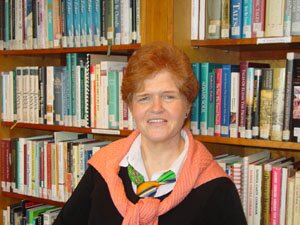| Deborah Lipstadt stands for the defense of truth and history |

|

|
|
Deborah Lipstadt has stood up in court in defense of history and truth. She has experienced what she explains to be the “world of difference between reading about anti-Semitism and hearing it up close and personal.†Just days before meeting with Deborah Lipstadt, the latest scandal in junk memoirs broke that went to the core of the very issue that Deborah Lipstadt has gained international recognition for – the fight to save the integrity of history and historical record. While there has already been far too much attention given to Misha Defonseca (Monique De Wael) and her preposterous saga, this is exactly the type of incident that keeps historians, like Deborah Lipstadt fighting for the defense of truth and history. When asked if an incident like this, especially in the shadow of the famous Binjamin Wilkomirski case, will have an impact on Holocaust scholarship, she replied that they most certainly will. Hoaxes of this sort, she explained, especially in the aggregate, will have the power to shed doubt on legitimate survivor’s testimony and memoirs. It fuels the fire of denier’s rhetoric and she explains the damage “can’t be underestimated. It just takes a couple of these to plant seeds of doubt.â€
When it was suggested that the publisher of Surviving with Wolves was irresponsible, she was very quick to agree. She explained that in the case of memoirs, it is sometimes an impossible task for a publisher to fact check every detail. In this case, however, three reputable historians had handed over statements to the publishers that did more than cast mere doubt on the veracity of this impossible tale. Deborah Lipstadt, while admitting that she is not much of a fiction junkie herself, questioned the value of books like Defonsesca’s and Wilkomirski’s even if they had been published initially as fi ctional pieces. She explained that the Holocaust so “beguiles the imagination†that perhaps there is no need for fiction of this sort at all. When questioned as to the value of a work like Naomi Ragen’s, The Covenant, that is a clear stated One-to-One Interview Deborah Lipstadt stands for the defense of truth and history work of fiction, she indicated that there is a way, to make use of the time period in a way that is responsible and true to the characters themselves, but this is not an easy task. How exactly did Deborah Lipstadt, while a recognised Holocaust historian and Judaic studies authority amongst academics, become a household name? The explanation goes back to 2000 when she was taken from the comfort of her world of academia, as a Professor of Modern Jewish and Holocaust Studies at Emory University, and thrust into one of the most well known libel court battles of our time. In 1993, after publishing her book entitled, Denying the Holocaust: The Growing Assault on Truth and Memory, Deborah Lipstadt was sued by the infamous David Irving for libel. While only six pages in total of this entire work made mention of David Irving, he nevertheless sued her for referring to him as a Holocaust denier. Along with publisher, Penguin Books, they assembled the legal defense “dream team†and fought a twelve week battle in UK court. Under standard operation in a UK libel case, the defendant has the burden of proof. They were therefore required to prove the truth of her statements. What Lipstadt understood from the very beginning was how much was truly at stake. It was history on trial. In the words of Mister Justice Gray, who produced the 334page written judgement detailing this bench trial, “History has had its day in court and scored a crushing victory.†As Professor Lipstadt explained, this was not a case of the Holocaust on trial, but of history. She did not take the stand, nor did survivors, for this was the responsibility of the historical record itself. “In this kind of going into court, for the fi rst time deniers found themselves in a setting with an external, independent authority (the judge). There is now a written record de-constructing their argument. It was such a net loss to deniers.†While Lipstdat has refused to take the podium along side David Irving in a debate, when questioned why she chose to go to the UK to even defend these absurd allegations, she responds that she really had no choice. By refusing to appear and defend, she tells Jewish Times Asia, the result would have been an entry of a default verdict in the UK courts. This verdict would have been a grave injustice to historians and a victory to Holocaust deniers. When asked why David Irving would risk such a “net loss†to his anti-Semitic verbatim, she replies, “Vanity of vanities, said Koheleth; vanity of vanities, all is vanity.†While in Hong Kong, she mentioned that she had been contacted by Irish radio asking her to appear in a show with David Irving. A similar situation occurred with a request by CNN to appear on a show presenting ‘both sides of the debate’. As Deborah explains, there is no need for this sort of discourse. Seemingly contradictory to her defense of history, she does not believe in laws outlawing Holocaust denial. As she explains, to do so would be “counterproductive†and furthermore this type of ban could even be dangerous. It would make Holocaust denial a “forbidden fruit†and therefore more desirable to a number of fringe groups. By the same token, to ban it would have the same effect as her failure to defend the libel case. It would suggest that the historical record is not able to stand on its own. When asked, are some fruits not so poisonous that they should be forbidden, she admits that that she can understand the need to have these sort of laws in Germany and Austria, given the historical context there. She gives the example of the impact of a rebellious college student walking through the a small town in the US donning a swastika and the impact of the same message today of that garment when worn on the main thoroughfares of Berlin. She gives the illustrated example of Philip Roth’s novel, Plot Against America. While earlier she said she was not much of a fiction reader, with a laugh, she says “ok here it is- fiction that I read and really enjoyed.†The book’s cover was illustrated with a swastika that was replaced for publication in the German version only. This she explains was a matter of scope and context. There is a difference, however, she cautions, between defending one’s right to free speech and “inviting them into your home.†Free speech is a legal right not an automatic ticket for entry into every forum. There are those that suggest that David Irving has now become the unlikely champion of free speech. As she explains, “he is no champion of free speech.†She stated that Irving even indicated that he would drop the case against her if all of her books were trashed. The effect of even history’s victory in court was chilling. She explains that while the truth prevailed, others have been silenced against speaking out against deniers like Irving because of the cost of being forced to defend the truth, history and memory in court. For Deborah Lipstadt, defending the history of a people victimised by the Holocaust was a battle she could not bear to lose. She has called it an honour. When the true witnesses, the survivors, are no longer with us, it will be the records of the historians alone that will be our tools to remember. Deborah Lipstadt stated that the rhetoric of the denier’s is getting worse and she is clear that it is anti- Semitism in no uncertain terms. Deborah Lipstadt’s courtroom battle and history’s victory will continue to be fought with the truth. She could not be silent when anti-Semitism looked her right in the eye.  (Issue April 2008) |

















